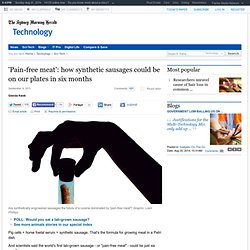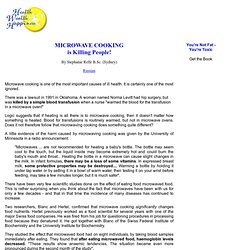

'Pain-free meat': how synthetic sausages could be on our plates in six months. Are synthetically engineered sausages the future of a cuisine dominated by 'pain-free meat'?

Graphic: Liam Phillips Pig cells + horse foetal serum = synthetic sausage. That's the formula for growing meat in a Petri dish. And scientists said the world's first lab-grown sausage - or "pain-free meat" - could be just six months away. Today, almost 1 billion people are undernourished, the World Bank said. And as the world's population hits 7 billion at the end of next month and 9.3 billion by 2050, according to United Nations' projections, the need for additional food sources will become more pressing. So can synthetic food grown from cells in a laboratory help to tackle world hunger? Mass producing meat in a lab Growing meat in a lab is not new - with tissue engineering already used for medical purposes, but creating synthetic food on a large scale is still in its early stages.
"I'm hopeful we can have a hamburger in a year," he told New Scientist. Feeding mega-cities What do you think? Mark B. Kristal: Placenta: To Eat or Not to Eat? Women, mainly in the United States, are lately announcing that they will eat placenta as part of their childbirth experience.

They expect to experience major health benefits like prevented or reduced postpartum depression. A couple of celebrities mentioned it and that brought placentophagia into the spotlight. What's going on? "Placentophagia" pertains to ingestion of placenta, fluids, and tissues by mothers during delivery. The behavior, which is almost universal among nonhuman mammals (whales and dolphins are exceptions), is virtually absent in human cultures, past and present. Human cultures have actually shown a strong aversion to placentophagia, and some have even imposed taboos against the practice. Today we are in the midst of another placentophagia fad. Unfortunately, there is no evidence showing that placentophagia by humans medically or physiologically ameliorates any of these problems.
Actually, placebo effects can occur even when beneficial components are present. Human genes engineered into experimental GMO rice being grown in Kansas. (NaturalNews) Unless the rice you buy is certified organic, or comes specifically from a farm that tests its rice crops for genetically modified (GM) traits, you could be eating rice tainted with actual human genes.

The only known GMO with inbred human traits in cultivation today, a GM rice product made by biotechnology company Ventria Bioscience is currently being grown on 3,200 acres in Junction City, Kansas -- and possibly elsewhere -- and most people have no idea about it. Since about 2006, Ventria has been quietly cultivating rice that has been genetically modified (GM) with genes from the human liver for the purpose of taking the artificial proteins produced by this "Frankenrice" and using them in pharmaceuticals.
With approval from the U.S. Department of Agriculture (USDA), Ventria has taken one of the most widely cultivated grain crops in the world today, and essentially turned it into a catalyst for producing new drugs. You can view that report here: Permalink to this article: Microwave Cooking is Killing You! MICROWAVE COOKING is Killing People!

By Stephanie Relfe B.Sc. (Sydney) Russian Microwave cooking is one of the most important causes of ill health. It is certainly one of the most ignored. There was a lawsuit in 1991 in Oklahoma. Logic suggests that if heating is all there is to microwave cooking, then it doesn't matter how something is heated. A little evidence of the harm caused by microwaving cooking was given by the University of Minnesota in a radio announcement: "Microwaves ... are not recommended for heating a baby's bottle.
There have been very few scientific studies done on the effect of eating food microwaved food. Two researchers, Blanc and Hertel, confirmed that microwave cooking significantly changes food nutrients. They studied the effect that microwaved food had on eight individuals, by taking blood samples immediately after eating. Who knows what results they would have found if they had studied people who ate microwaved food for a year or more?